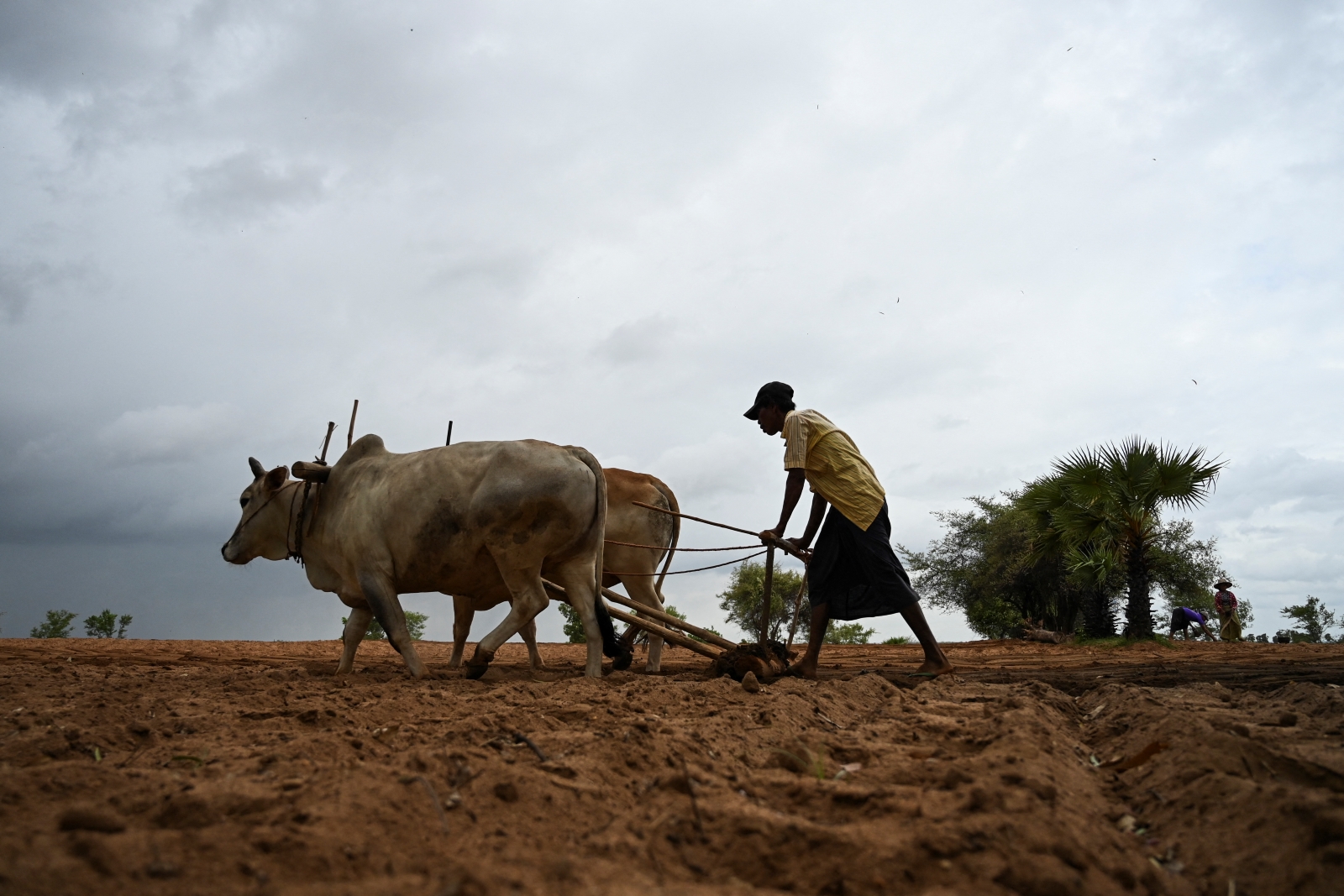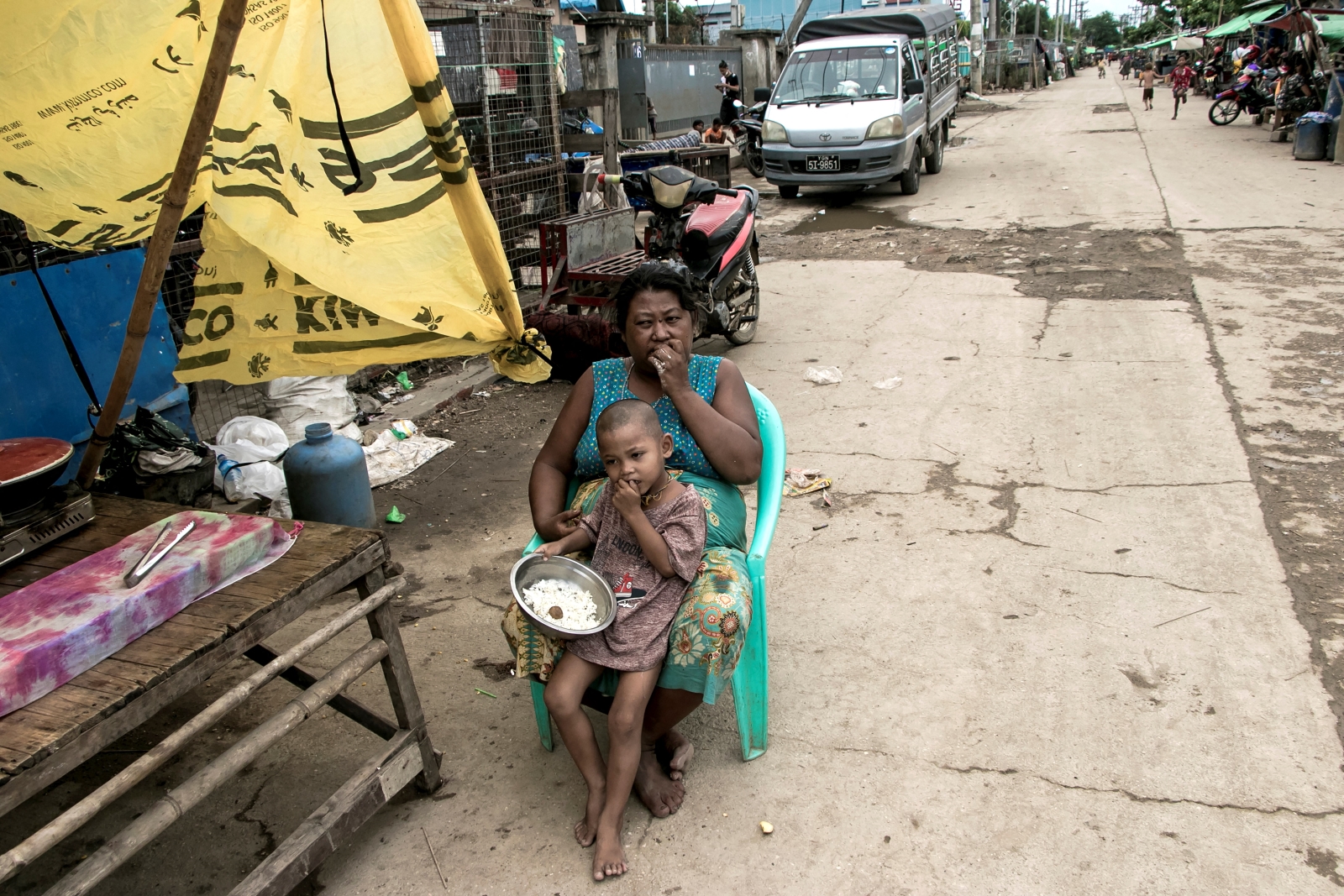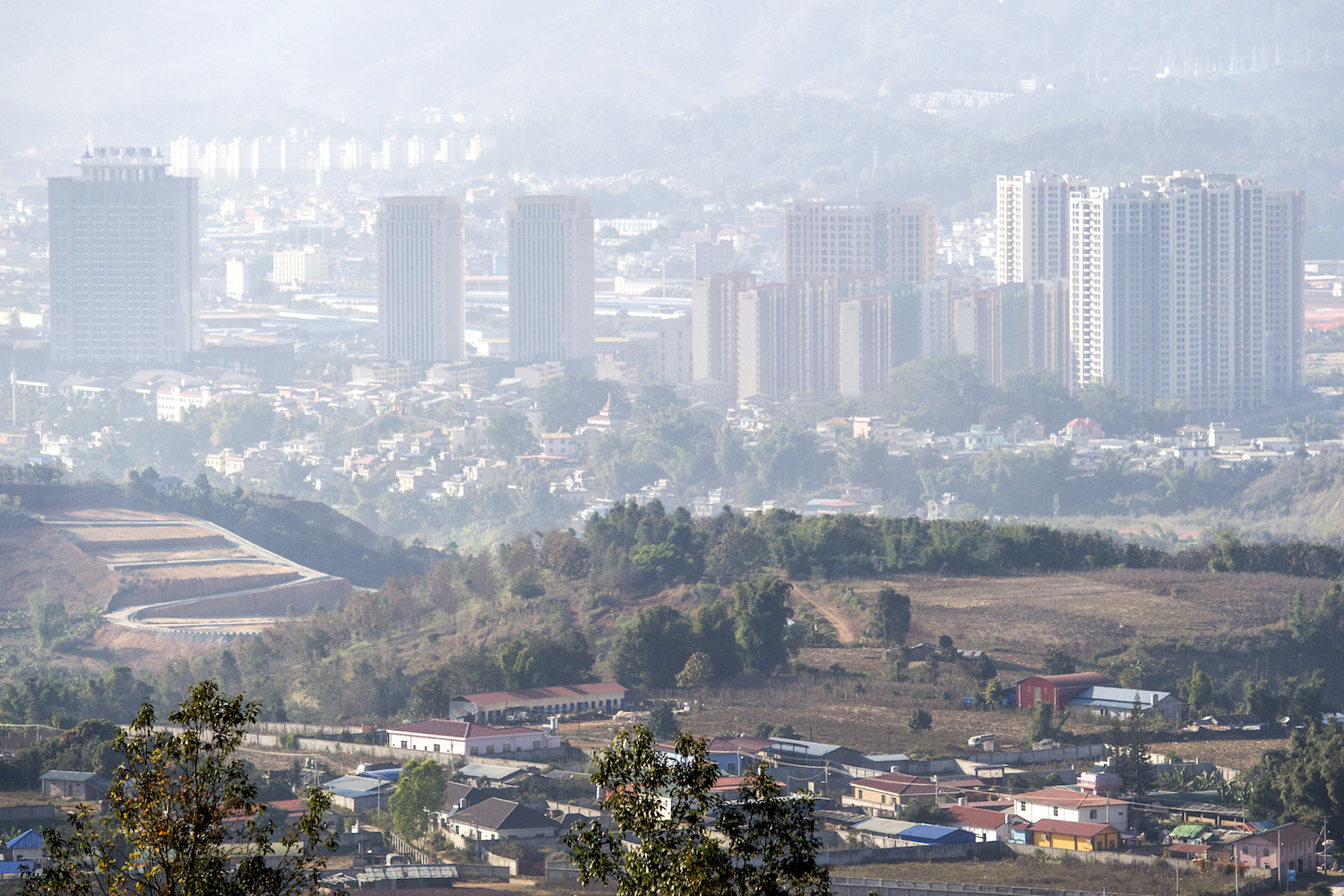Government officials are sorting through hundreds of thousands of complaints from households that missed out on a November cash transfer, as new research from the World Bank reveals the heavy toll of the pandemic on vulnerable families.
By HTIN LYNN AUNG | FRONTIER
A queue of about 100 people snakes along the road in front of the Anawmar 1 ward office in Thaketa Township on the morning of December 7. Everyone in the queue is holding their ta kaung sin, an official document that lists the members of their household, with a hopeful look on their face.
What they are hoping for is money: K40,000, to be precise.
A red vinyl sign near the entrance to the ward administrator’s office reads: “Poor, hand-to-mouth families who live in the ward and were not included for various reasons in the list of families when the government provided support can apply in person at the General Administration Department office for a government cash handout.”
The sign is dated December 4, and says those who missed out on the COVID-19 cash transfer back in November have until December 7 to apply in person.
Among those in the line is Ma Aye Aye Aung, a 40-year-old mother of two boys. She said she didn’t really understand the criteria for the cash transfer programme but had come because she was told she might be eligible.
“I’ve never got anything like this from the government before, and I don’t know if we’ll be accepted,” she said. “My husband works as vendor selling ice lollies. I don’t understand how they decide who gets the payment.”
The November cash transfer was the fourth round of handouts for low-income and vulnerable households aimed at softening the economic blow of COVID-19, which has plunged the economy into recession for much of the year and disproportionately affected poorer households.
In April, the government provided more than 4 million families with five basic food items to get them through a national shutdown, while around 5.4 million families received two payments of K20,000 each in July and September.
About 6.1 million households received the November cash transfers, which was set at K40,000 in areas under stay-at-home orders, including mainland Yangon Region, and K20,000 in all other areas. In total, the government says it has spent about K575 billion on these four cash and in-kind transfers – an unprecedented sum in a country with no history of a functioning welfare state, but still far less than what will be needed to avoid millions plunging into poverty.
In its December 2020 Myanmar Economic Monitor, the World Bank said the economic impact of the pandemic response had hit the “poorest and most vulnerable” hardest, and they were turning to negative coping strategies, including borrowing and cutting back on spending, to get by.
“The ongoing restrictions under the second wave are putting more households at risk of entering poverty. With limited savings, many poor households are being forced to reduce their food and non-food consumption in order to cope with income losses,” it said.
Between August and October, the share of households experiencing moderate to severe food insecurity increased from 12 to 25 percent, the report said, and poorer households reported having trouble meeting debt repayments.
The report warned that the poverty rate could be as much as five percentage points higher in 2022-23 unless the government increases cash support to the poorest households and maintains it well into next year.
A deluge of complaints
The government’s response has been constrained not only by its fiscal position, but also a lack of accurate data and weak bureaucracy.
Despite reaching more households than earlier initiatives, the November cash distribution was also the most controversial to date, with hundreds of thousands complaining that they missed out despite being in financial straits.
Such complaints had also emerged after earlier rounds of support. But they have been amplified this time by growing desperation and poverty, particularly in urban areas such as Yangon and Mandalay where stay-at-home orders have resulted in job layoffs.
Officials cited several other factors behind the surge in complaints, including the increased size of the transfer in stay-at-home areas and confusion over who was eligible, which they said was fed by rumours that the government was planning to provide cash to every household.
U Kyaw Zaw Linn, director and spokesperson for the Ministry of the Union Government Office, which oversees the GAD, said that government support plans were administered by the respective state and region governments, leading to inconsistent approaches across the country.
“Each state and region has their own definition of ‘basic-income people’ based on the instructions from the respective chief minister,” he said.
In Mandalay Region, for example, any household without a regular income was eligible. In Yangon, the government said the payment was for the unemployed, daily wage labourers, and those doing specific jobs. The latter category included street vendors, trishaw drivers, masons, carpenters, porters, fishers, boat drivers and farm labourers. They must also have a household member list to be considered for the cash transfer.
On November 12, about 150 residents of Yangon’s Mingaladon Township who missed out on the cash transfer protested in front of the GAD office in Kyankinsu ward. The following day, a Yangon Region Hluttaw lawmaker for North Okkalapa Township, U Zaw Lwin of the National League for Democracy, told BBC Burmese that the NLD township office was compiling a new list of recipients to submit to the regional government because so many local residents had missed out.
Similar stories emerged in other states and regions, prompting State Counsellor Daw Aung San Suu Kyi to promise that the government would open offices to receive complaints, which she said would be resolved quickly.
Claiming that “everything went smoothly” during earlier distributions, she acknowledged in a speech on November 16 that there had been “some disputes” this time around. “If you have been left behind for any reason, we now have a centre for complaints … So, just calm down and make a complaint at the complaint centre … We are not going to leave anyone behind”.
The following day, the government announced offices and phone numbers where complaints could be submitted.
Aung San Suu Kyi’s public comments unleashed a deluge of complaints. Within three weeks the government had received more than 210,000 applications from households who claimed to have missed out despite being eligible, Minister for the Union Government Office U Min Thu wrote on his Facebook page on December 8.
Nearly all of those it examined were found to be valid. Min Thu wrote that local investigation teams comprising government officials and community elders had already checked almost 182,000 of the complaints and fewer than 3pc were found to be false.
“The government will try to provide support to those who have missed out,” he wrote.
Still waiting
Despite promising a speedy resolution, the reality is likely to be far different. In some townships, complaints are still flowing in, and many still have to be checked. Officials say additional cash distributions for those who missed out in November could still be months away.
U Soe Linn Htike, township administrator for Thaketa in Yangon Region, said his office had received 12,000 applications.
“The lists [of residents found to be newly eligible for relief] were compiled on December 7 and they are being checked,” he said on December 11. “We haven’t submitted them to the district level yet.”
The head of Dawbon Township’s GAD, U Kyaw Thet Htoo, said his office was accepting complaints until December 16, and lists were still being compiled.
“More and more complaint letters are arriving every day,” Kyaw Thet Htoo said. “We’re accepting them all and checking them.”
Ministry of the Union Government Office spokesperson Kyaw Zaw Linn said, “We’ll only know the final figures when each state and region completes the review process.”
Dawbon Township administrator Kyaw Thet Htoo said his office had simply provided cash to the same “grassroots families” it had supported with earlier handouts.
“There have been some complaints from people who mistakenly think that the government is supporting every household. But we certainly haven’t received that instruction from the government,” he said.
One ward administrator said most of the complaints had come from families who had recently acquired a household member list in order to receive the latest handout.
This document lists the residents of a household and their address, but few people bother to keep them updated – for example, when they change address, or when children move out of a household – because of the time and money required when dealing with the immigration department. With K40,000 on offer – and potentially more handouts to come – some have decided it’s a good time to get their documents in order, said U Myo Min Latt, administrator of Htoo Pa Yone 1 ward in Thaketa.
As a result, the number of registered households in his ward has risen from 2,950 to 3,650 since the government announced it would provide cash handouts of K40,000 in November.
Most of the additional households are younger families who had remained on their parents’ household list rather than acquiring their own, he said.
“Most complaints are from these kinds of people. We are making arrangements for them in consultation with elders in the community but we are facing many problems on the ground,” he said.
As Myo Myin Latt spoke to Frontier, Ma Thandar Win, 34, waited patiently in line outside the ward office to submit her application for the K40,000 payment, her household list in hand.
Her family of four has lived in the ward since 2013. They’ve been struggling to make ends meet since August, when her husband lost his job as a welder on a construction site, but like many others missed out on the cash transfer in November.
“I run a small shop but business isn’t good these days and we’re really struggling,” said Thandar Win. “If we can get the support from the government, it will be really helpful.”









